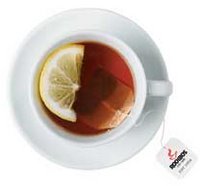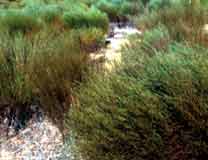Rooibos Tea

I'm working on exiting school before my toddler begins. For my master's thesis, I'm researching rooibos tea. Specifically, I'm measuring the antioxidant activity of rooibos tea.
Rooibos tea is a little shrub that grows in one particular spot on Earth: Cedarberg, South Africa. It's a needly little guy with a very long taproot so that it can bake in the South African sun while gathering up the rare water. South Africans have been drinking the stuff for well over a century, but here in the U.S. I'd only heard of it about 4 years ago. (Now you can find it in Krogers/Ralph's, Whole Foods, Wild Oats, Trader Joe's, etc.)

Rooibos has a sweet taste, is caffeine free and low in tannins. It's an herbal tea (from Aspalathus linearis), whereas black, green and oolong teas are from a different plant (Camellia sinensis). More on teas and the fermentation that makes them next time, if I remember...
Now, all fruits and vegetables, as well as teas contain phytochemicals. The term refers to plant substances that affect humans (beyond being a carbohydrate, protein or fat). Many of these phytochemicals protect the plant. Among them are a group of compounds called polyphenols, and among those are some called flavonoids. Those are what I'm studying. They have antioxidant activity that, during the lifetime of the plant protects the leaves from sun damage and oxidation that could kill the plant. Our bodies have similar mechanisms designed to ward off the oxidative products of our own metabolism, and the oxidative effects of our environment (like pollution). As we age, our natural mechanisms work less efficiently and eventually we succumb to disease. The protection conferred by flavonoids to the plant often translates to antioxidant activity that might well protect us, and that's why it's being studied.
This is getting long so I'll explain oxidation in more detail later (it's a real page-turner!). What's important: oxidation is believed to cause aging and contribute to cancer, heart disease and possible Alzheimer's, Parkinson's and a host of other diseases that do us in. Also important: before you start megadosing on antioxidants, know that many antioxidants, when inhaled like candy on Halloween night (as pills or potions), perform as PRO OXIDANTS.
Next time: what the hell makes green tea green and black tea black and what the hell difference it makes, and if you're oh so lucky, some blathering on how oxidation works.

0 Comments:
Post a Comment
<< Home